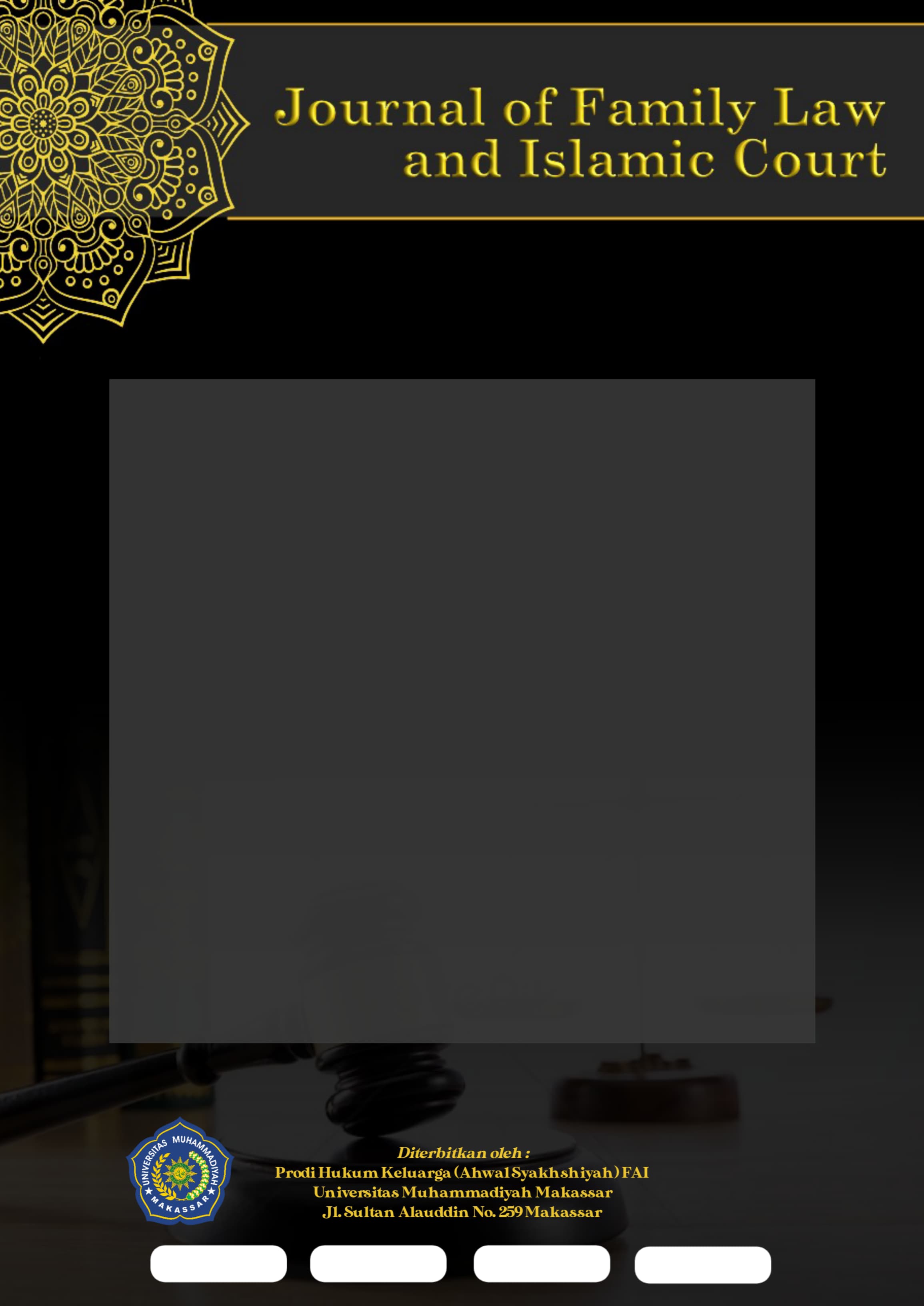Dynamics of The Rules for Changing Sharia Law According to Ibnul Qayyim Al-Jauziyyah
DOI:
https://doi.org/10.26618/jflic.v3i2.15864Keywords:
Islamic law, fiqh maxim, adaptability, syari’ah authenticityAbstract
The diversity of human life necessitates order to achieve social harmony. This study examines the significance of divine law (syari’ah ilahiyyah) as superior to tasyri’ wad’i (man-made law), focusing on the consistency of Islamic law and its relationship to the fiqh maxim “Laa Yunkaru Taghayyur al-Ahkam bi Taghayyur al-Azman” (legal rulings may change with changing times). Using a literature-based method, the analysis incorporates classical and contemporary scholarly perspectives alongside practical applications of the maxim. The findings reveal that rulings derived directly from textual evidence (nass) are immutable, whereas those based on custom (urf), public interest (maslahah), or independent reasoning (ijtihad) may adapt to changing contexts. The maxim is narrowly applied to rulings influenced by customs, leaving core scriptural rulings unchanged. Examples include theft punishments adjusted for customary definitions of safekeeping, evolving zakat policies, and contemporary regulations such as traffic laws. These findings affirm that Islamic law combines permanence in foundational principles with flexibility in contextual applications, ensuring its relevance across times and places. The study concludes that understanding the boundaries of this fiqh maxim is crucial for maintaining the balance between the timelessness of Islamic law and its adaptability to modern challenges, preserving both its authenticity and practical utility.
--
Keberagaman kehidupan manusia memerlukan keteraturan untuk mencapai harmoni sosial. Studi ini mengkaji pentingnya hukum ilahi (syari’ah ilahiyyah) yang dianggap lebih unggul dibandingkan dengan tasyri’ wad’i (hukum buatan manusia), dengan fokus pada konsistensi hukum Islam dan hubungannya dengan kaidah fiqih “Laa Yunkaru Taghayyur al-Ahkam bi Taghayyur al-Azman” (hukum dapat berubah sesuai dengan perubahan zaman). Dengan pendekatan berbasis literatur, analisis ini mencakup perspektif ulama klasik dan kontemporer serta aplikasi praktis dari kaidah tersebut. Temuan menunjukkan bahwa hukum yang bersumber langsung dari nash bersifat tetap, sementara hukum yang didasarkan pada adat (urf), kemaslahatan (maslahah), atau ijtihad dapat disesuaikan dengan konteks yang berubah. Kaidah ini diterapkan secara terbatas pada hukum yang dipengaruhi oleh adat kebiasaan, sementara hukum nash tetap tidak berubah. Contoh penerapan mencakup hukuman pencurian yang disesuaikan dengan definisi adat penyimpanan barang, kebijakan zakat yang berkembang, dan peraturan kontemporer seperti lalu lintas. Temuan ini menegaskan bahwa hukum Islam menggabungkan keabadian prinsip-prinsip dasar dengan fleksibilitas dalam aplikasi kontekstual, sehingga memastikan relevansinya di berbagai waktu dan tempat. Studi ini menyimpulkan bahwa pemahaman batasan penerapan kaidah fiqih ini sangat penting untuk menjaga keseimbangan antara keabadian hukum Islam dan kemampuannya beradaptasi dengan tantangan modern, sekaligus mempertahankan keaslian dan kegunaannya secara praktis.
References
Aditya, Z. F., Fuadi, A. B., & Yulistyaputri, R. (2023). The Role of Islamic Law in Enriching the Decisions of the Indonesian Constitutional Court. Frontiers in Law, 2, 24–29. https://doi.org/10.6000/2817-2302.2023.02.04
al-Jazaini, M. bin H. (1436). Ma’alim al-Ushuli al-Fiqhi ’Inda Ahli al-Sunnati wa Al-Jamaah. Dar Ibnu Al-Jauzi.
al-Musyaiqih, K. bin A. (1436). Syarah al-Qawa’id wa al-Ushul al-Jami’ah. Maktabah Al-Rusyd.
Al-Bakistaani, Z. bin G. K. (n.d.). Taudhih Ushuli al-Fiqhi ’ala Manhaji Ahli al-Hadis (cet. III). Dar Ibnu al-Jauzi.
Alotaibi, H. A. (2021). The Challenges of Execution of Islamic Criminal Law in Developing Muslim Countries: An Analysis Based on Islamic Principles and Existing Legal System. Cogent Social Sciences, 7(1). https://doi.org/10.1080/23311886.2021.1925413
Al-Saayis, M. A. (n.d.). Tarikh Fiqhi Al-Islaamiy (5th ed.). Dar Al Kutub AL Ilmiyyah.
Anwar Sholeh Abu Zaid. (n.d.). Al-Mukhtoshor fii Maa ’Urifa min Qawa’id al-Fiqhi (II). Dae al-Shomo’iy.
Baderin, M. A. (2021). The Nature of Islamic Law. 19-C2.P17. https://doi.org/10.1093/actrade/9780199665594.003.0002
Genç, S. Y., & Syed, H. (2019). Kur’an-I Kerim Tefsiri Temelinde Evrensel Hukukun Kur’anî Prensipleri. Bilimname, 2019(39), 165–186. https://doi.org/10.28949/bilimname.592756
Ibnu Taimiyah al-Harrani. (n.d.). Majmu’ Fatawa (I). Majma’ Malik Fahd.
Ibnul Qayyim al-Jauziyyah. (n.d.). I’lamul Muwaqqi’in ’an Rabbi al-’Alamin (I). Dar Ibnu al-Jauzi.
Kamilah al-Kawari. (n.d.). AL-Khulashoh fi Ushuli al-Fiqhi (Cet. I). Dar Ibnu Hazm.
Kementerian Agama. (2023). Al-Qur’an dan Terjemahnya, QS. al-An’am/6:141. Kemenag RI. https://quran.kemenag.go.id/sura/6/141
Kementerian Agama RI, K. A. (2023). Al-Qur’an dan Terjemahnya. Kemenag RI. https://quran.kemenag.go.id/quran
Khalaf, A. W. (n.d.). Ilmu Ushuli al-Fiqhi (Cet. I). Maktabah Dar al-Fajr.
Khosyi’ah, S., Faizin, B., Maylawati, D. S., & Ramdhani, M. A. (2021). Society Education Media About Islamic Law Through Web-Based Application. https://doi.org/10.2991/assehr.k.210715.096
Massadi, M. (2019). Peluang Dan Tantangan Pelaksanaan Pidana Islam Di Indonesia. Al-Bayyinah, 3(2), 252–268. https://doi.org/10.35673/al-bayyinah.v3i2.473
Mathar, M. Q. (2013). Islam dan Masyarakat Bangsa (M. Q. Mathar, Ed.). Alauddin University Press. https://repositori.uin-alauddin.ac.id/482/
Meirison, M., & Yusna, D. (2022). Problems in the Implementation of Islamic Law in the Contemporary Era. Jurnal Al-Ahkam, 13(1), 49–60. https://doi.org/10.15548/alahkam.v13i1.4425
Muhammad bin Sholeh al-Utsaimin. (n.d.). Manzhumah Ushuli al-Fiqhi wa Qawa’idih (cet. V). Dar Ibnu al-Jauzi.
Muhammad bin Umar Salim Bazmul. (n.d.). Nizoomu al-Syari’ati Madkhol li Ilmi Maqashidi al-Syari’ati (I). Dar al-Mirots al-Nabawi.
Muhammad Shidqi al-Burniy. (n.d.). Al-Wajiz fi Iydhohi Qawa’id al-Fiqhi al-Kulliyyah (cet. V). Mu’assasah Al Risalah.
Nashir bin Muhammad al-Ghomido. (n.d.). Al-Madhkolu ila Dirasati al-Fiqhi al-Islaami. Dar Thoyyibah al-Khodra’.
Nopriansyah, W. (2019). ISLAMIZATION OF ECONOMY IN INDONESIA:From Politics to Law. Hikmatuna Journal for Integrative Islamic Studies, 5(2), 182–193. https://doi.org/10.28918/hikmatuna.v5i2.2169
Purkon, A., Buang, A. H., & Jamaludin, M. H. (2022). The Role of Supreme Court Jurisprudence in Development of Islamic Family Law in Indonesia. Al-Qadha Jurnal Hukum Islam Dan Perundang-Undangan, 9(2), 362–376. https://doi.org/10.32505/qadha.v9i2.4111
Rohmah, S. (2021). The PATTERN OF ABSORPTION OF ISLAMIC LAW INTO NATIONAL LAW: Study of the Halal Product Guarantee Law in the Perspective of Maqashid Shari’ah. Jurisdictie Jurnal Hukum Dan Syariah, 12(1), 20–47. https://doi.org/10.18860/j.v12i1.10521
Rueden, C. v., Redhead, D., O’Gorman, R., Kaplan, H., & Gurven, M. (2019). The Dynamics of Men’s Cooperation and Social Status in a Small-Scale Society. Proceedings of the Royal Society B Biological Sciences, 286(1908), 20191367. https://doi.org/10.1098/rspb.2019.1367
Samuni, L. (2023). Cooperation Across Social Borders in Bonobos. Science, 382(6672), 805–809. https://doi.org/10.1126/science.adg0844
Saputra, H., Yunita, N., Mardhiaturrahman, A., & Purnamasari, W. (2021). Interpretations of Verses About Islamic Criminal Law and Its Polemics in Indonesia’s Positive Law. Ajis Academic Journal of Islamic Studies, 6(1), 79. https://doi.org/10.29240/ajis.v6i1.2612
Shabana, A. (2013). Negation of Paternity in Islamic Law Between Liʿān and DNA Fingerprinting. Islamic Law and Society, 20(3), 157–201. https://doi.org/10.1163/15685195-0008a0001
Suciyani. (2022). Hudud in Indonesia: In Perspective of Pancasila Justice and Islamic Justice. 83–89. https://doi.org/10.2991/978-2-494069-81-7_10
Sulaiman al-Ruhaili. (n.d.-a). AL-Qawa’id al-Fiqhiyyah al-Muta’alliqah bi al-Buyu’ (cet. I). Dar al-Mirots al-Nabawi.
Sulaiman al-Ruhaili. (n.d.-b). Al-Qawa’id al-Musytarakah baina Ushuli al-Fiqhi wa al-Qawa’id al-Fiqhiyyah (Cet. I). Dar al-Mirots al-Nabawi.
Sulaiman al-Ruhaili. (n.d.-c). Al-Ta’liqaatu al-Naafiatu ’ala al-Ushuli wa al-Qawa’idi al-Jaami’ati (I). Dar al-Mirots al-Nabawi.
Young, S. N. (2013). The Effect of Raising and Lowering Tryptophan Levels on Human Mood and Social Behaviour. Philosophical Transactions of the Royal Society B Biological Sciences, 368(1615), 20110375. https://doi.org/10.1098/rstb.2011.0375
Downloads
Published
Issue
Section
License
Journal of Family Law and Islamic Court © 2022 by JFLIC is licensed under CC BY-NC-SA 4.0
In the event that the article is received by the Editorial Team of Journal of Family Law and Islamic Court there is a decision to publish the article, the copyright of the article will be transferred to Journal of Family Law and Islamic Court.
Department of Ahwal Syakhsiyah, Faculty of Islamic Studies, Universitas Muhammadiyah Makassar as the publisher of Journal of Family Law and Islamic Court holds the copyright of all articles published in this journal.
Department of Ahwal Syakhsiyah, Faculty of Islamic Studies, Universitas Muhammadiyah Makassar holds the right to reproduce and distribute the article and author is not allowed to publish the same article published in this journal.
Statement of Authenticity and Manuscript Copyright can be downloaded: here
After filling in the statement letter, please send via e-mail: jflic@unismuh.ac.id












